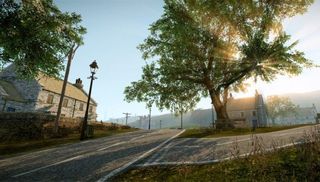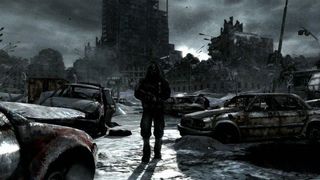Everybody's Gone to the Rapture creator Dan Pinchbeck on designing an appealing post-apocalypse

Everyone's dead and there's no hope. It's a premise that Dan Pinchbeck approached with surprising positivity. Pinchbeck created post-apocalyptic survival game Everybody's Gone to the Rapture, and his GDC talk How to Build a Better Apocalypse took us through some of design principles behind it—starting with the notion that if the world has ended, at least things can't get much worse.
In this genre, Pinchbeck pointed out, you're surrounded by traces of the world, but “its loss is permanent and cannot be reclaimed.” There is a loss of life, society, comfort, hope, and the basic means of survival. Your life is not merely altered by this event - it's reduced, without the chance of being rebuilt. The story takes a highly personal angle, with no possibility of global action.
“You're basically dead and trying to eke out as much time as possible,” says Pinchbeck. “The world's ending, so there are no heroics any more. It flips our normal understanding on its head. So why is this bleakness so appealing?”
Pinchbeck argues it's because here in this desolate setting is where design and gameplay fuse holistically.

For example, the norm of post-apocalyptic gameplay is isolation. Even in games with other players, like Day Z, the last thing you want to do is meet another player. That's because the struggle isn't to kill in these games—it's to survive, no matter how grindy or mundane that seems. In Half-Life 2, you may be struggling to kill an enemy at the top of a tower, but in Day Z you're struggling to get a can of beans. This is great for designers, as they need less AI, fewer characters, less expensive rendering and because every encounter is suddenly imbued with significance, from its rarity alone. In Day Z, the incentives are towards avoidism and silence.
Similarly, that survival need – making a can of beans your prized possession—keeps the focus small. I Am Alive or Stalker: Call of Pripyat follow Cormac MacCarthy's The Road in making the player just want to live for another hour, and the things they have to do are recognisable; finding a key for a house where there's a can opener takes on great significance when your player is hungry, as it's a universal sensation we can empathise with. The game doesn't even have to do anything mechanically different – in I Am Alive you're doing Capture The Flag and Bombing Runs, but by hunting for another human's inhaler, you feel like a king when you get it. Pripyat is even more mundane; it's to find some soldiers and go home, without the world being changed at all. He calls this 'reduced heroics'.
On the other hand, the game's limited resources mean that you know when you're doomed. Pinchbeck points to Metro 2033's ammunition system and the bullet sponge Librarians. “In Metro you can finish a firefight and know you're dead. That moment of thinking 'I'm fucked' is really powerful and games don't do it enough.” Players also love creating stuff themselves, so every item gains significance because it might be useful as money or as a component; as in Fallout 3 or Dead Rising.
The biggest gaming news, reviews and hardware deals
Keep up to date with the most important stories and the best deals, as picked by the PC Gamer team.

Post-apocalyptic games also push towards simplified societies. Rage and Fallout excel here, with post-technology societies surviving with the bodged-together tech of the past and the tribalism investing normal mechanics with extra significance; kill a Fallout ghoul and you're also playing into the hand of the racist elite humans. Again, Metro's crammed, terrified stations make perfect vignettes, because you spend so much time alone. There's no god or Cortana figure to show you where to go. Similarly, killing another human in these worlds takes on extra significance; Nathan Drake might think nothing of massacring 400 men, but to kill one for his bread in Stalker is a poignantly selfish act.
Why would that be fun for the player? It needn't be, says Pinchbeck—only meaningful. As he observes: “Hamlet's not fun. Books and films are bleak and dark.” Why not games, too?
Most Popular






